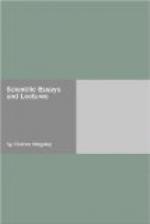What physical science may do hereafter I know not; but as yet she has done this:
She has enormously increased the wealth of the human race; and has therefore given employment, food, existence, to millions who, without science, would either have starved or have never been born. She has shown that the dictum of the early political economists, that population has a tendency to increase faster than the means of subsistence, is no law of humanity, but merely a tendency of the barbaric and ignorant man, which can be counteracted by increasing manifold by scientific means his powers of producing food. She has taught men, during the last few years, to foresee and elude the most destructive storms; and there is no reason for doubting, and many reasons for hoping, that she will gradually teach men to elude other terrific forces of nature, too powerful and too seemingly capricious for them to conquer. She has discovered innumerable remedies and alleviations for pains and disease. She has thrown such light on the causes of epidemics, that we are able to say now that the presence of cholera—and probably of all zymotic diseases—in any place, is usually a sin and a shame, for which the owners and authorities of that place ought to be punishable by law, as destroyers of their fellow-men; while for the weak, for those who, in the barbarous and semi-barbarous state—and out of that last we are only just emerging—how much has she done; an earnest of much more which she will do? She has delivered the insane—I may say by the scientific insight of one man, more worthy of titles and pensions than nine-tenths of those who earn them—I mean the great and good Pinel—from hopeless misery and torture into comparative peace and comfort, and at least the possibility of cure. For children, she has done much, or rather might do, would parents read and perpend such books as Andrew Combe’s and those of other writers on physical education. We should not then see the children, even of the rich, done to death piecemeal by improper food, improper clothes, neglect of ventilation and the commonest measures for preserving health. We should not see their intellects stunted by Procrustean attempts to teach them all the same accomplishments, to the neglect, most often, of any sound practical training of their faculties. We should not see slight indigestion, or temporary rushes of blood to the head, condemned and punished as sins against Him who took up little children in His arms and blessed them.
But we may have hope. When we compare education now with what it was even forty years ago, much more with the stupid brutality of the monastic system, we may hail for children, as well as for grown people, the advent of the reign of common sense.
And for woman—What might I not say on that point? But most of it would be fitly discussed only among physicians and biologists: here I will say only this: Science has exterminated, at least among civilised nations, witch-manias. Women—at least white women—are no longer tortured or burnt alive from man’s blind fear of the unknown. If science had done no more than that, she would deserve the perpetual thanks and the perpetual trust, not only of the women whom she has preserved from agony, but the men whom she has preserved from crime.




